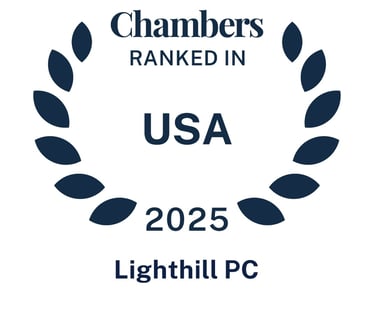Imports of Ferrosilicon from Brazil, Kazakhstan, Malaysia, and Russia
Petitions for Antidumping & Countervailing Duties
U.S. producers of ferrosilicon, CC Metals and Alloys, LLC, and Ferroglobe USA, Inc., filed international trade petitions against imports of ferrosilicon from Brazil, Kazakhstan, Malaysia, and Russia. Ferrosilicon is primarily used in steel manufacturing, cast iron production, and the production of silicon steel for electrical applications. The total value of the subject imports in 2023 was about $490 million based on U.S. Census import data.
The petitions threaten the imposition of antidumping (“AD”) and countervailing duties (“CVD”) on imports of ferrosilicon, alleging the following duty rates:
Antidumping Duties
• Brazil: 20 percent
• Kazakhstan: 212.49 percent
• Malaysia: 162.59 percent
• Russia: 143.03 percent
Countervailing Duties based on
• Brazil: twenty subsidy programs
• Kazakhstan: twenty-one programs
• Malaysia: thirteen subsidy programs
• Russia: twenty-three subsidy programs
For foreign producers, exporters, and U.S. importers participating in these investigations, the duty rates often end up much lower than the alleged rates, sometimes resulting in no duties imposed at all.
The Focus of the Investigations:
The petitions were filed with the two U.S. agencies involved in antidumping and countervailing duty investigations: the U.S. International Trade Commission (ITC) and the U.S. Department of Commerce (DOC).
1. The DOC will calculate the dumping margins and countervailable subsidy rates for foreign exporters of ferrosilicon from these countries.
2. The ITC will assess whether imports from these countries are causing material injury to the U.S. ferrosilicon industry.
Dumping refers to the act of a foreign company selling a product in the U.S. at a price below its normal value. This value is determined by the foreign company’s above-cost sales in its home market or a comparison market. This process evaluates price discrimination.
Countervailable subsidies are financial assistance from foreign governments that benefit the production, manufacture, or exportation of goods and are specific to the exporter, industry, or geographic region. These subsidies may be in the form of discounted loans, tax breaks, direct grants, or low-cost rent, among others.
The injury investigation concerns whether the U.S. industry is materially injured or threatened with material injury by reason of the allegedly dumped and subsidized imports.
Participation:
The DOC is currently evaluating the sufficiency of the petitions and is set to decide whether to officially launch the investigations by April 17, 2024. After the initiation, participation is almost always vital for maintaining U.S. market share and staying competitive. In the antidumping and countervailing duty investigations, the DOC normally examines two companies from each country, typically chosen based on their export volume to the U.S. These companies will be required to actively participate in the investigations, and the dumping margins and countervailable subsidy rates determined for them will likely set the duty rates for other producers and exporters.
The ITC initiated its injury investigation on March 28, 2024, and will have 45 days to reach a preliminary determination. Producers, importers, and exporters can participate in this investigation by responding to questionnaires about the production, importation, and sales of ferrosilicon. These questionnaires are due by April 11, 2024. Parties can also defend themselves at the ITC against claims that imports are harming the U.S. industry.
Retroactive duties may be required for merchandise currently in transit or expected to be shipped soon. The additional duties normally become effective when the DOC makes affirmative preliminary determinations. However, if the petitioners later allege critical circumstances and dumping or subsidization is determined, imports arriving after March 28, 2024 (the petition filing date), but before the AD and CVD preliminary determination dates, could face retroactive cash deposits.
Key Dates:
DOC Initiation: April 17, 2024
ITC Preliminary Determination: May 13, 2024
DOC CVD Preliminary Determinations: June 21, 2024
DOC AD Preliminary Determinations: September 4, 2024
DOC CVD Final Determinations: September 4, 2024
DOC AD Final Determinations: November 18, 2024
ITC Final CVD Determination: October 21, 2024
ITC Final AD Determination: January 2, 2025
Issuance of Orders: January 9, 2025
Note: The above deadlines are estimates and might be extended under certain circumstances.
REQUESTED SCOPE OF MERCHANDISE UNDER CONSIDERATION
The scope of this investigation covers all forms and sizes of ferrosilicon, regardless of grade, including ferrosilicon briquettes. Ferrosilicon is a ferroalloy containing by weight four percent or more iron, more than eight percent but not more than 96 percent silicon, three percent or less phosphorus, 30 percent or less manganese, less than three percent magnesium, and 10 percent or less any other element. The merchandise covered also includes product described as slag, if the product meets these specifications.
Subject merchandise includes material matching the above description that has been finished, packaged, or otherwise processed in a third country, including by performing any grinding or any other finishing, packaging, or processing that would not otherwise remove the merchandise from the scope of the investigations if performed in the country of manufacture of the ferrosilicon.
Ferrosilicon is currently classifiable under subheadings 7202.21.1000, 7202.21.5000, 7202.21.7500, 7202.21.9000, 7202.29.0010, and 7202.29.0050 of the HTSUS. While the HTSUS numbers are provided for convenience and customs purposes, the written description of the scope remains dispositive.




